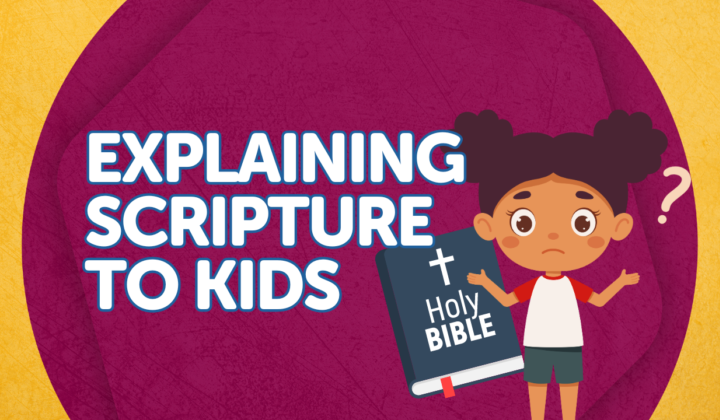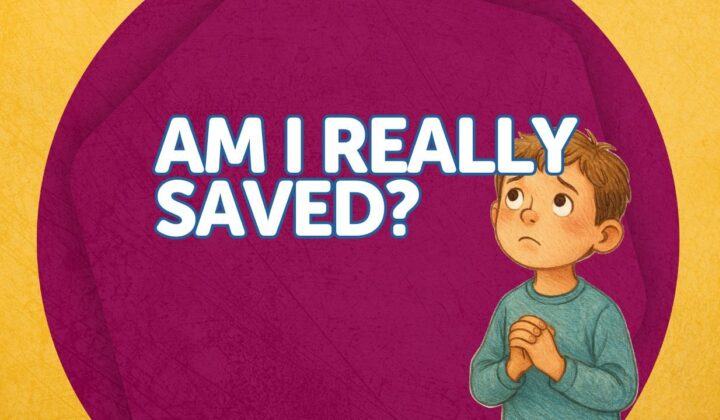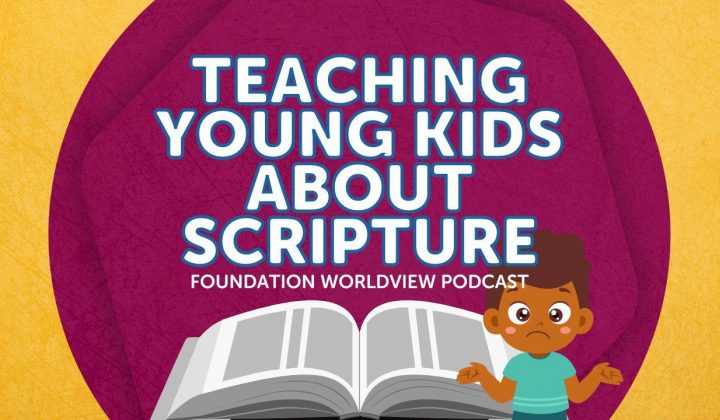Learn more about the journey that led to us equipping kids to carefully evaluate every idea they encounter.
Meet members of our team who have contributed to curriculum development.
Hear from real users of the Foundation Curriculum.
Learn what we believe about God, Jesus, Scripture, and more.
Helping Kids Understand Revelation Without Fear
Preparing Children for the End Times: Understanding Revelation
Hello, friends. Today's podcast question says, "I was told recently that I need to prepare my nine-year-old for what is coming. In other words, the end times, as I am shielding her too much from TV news. How do you talk to your child about the book of Revelation and the difficult times ahead while they are still so young and growing in the faith?"
This is an interesting question for us to think through. How do we help our children think through the end times and understand the book of Revelation? That's what we're going to dive deep into today on the Foundation Worldview Podcast, where we seek to answer your questions so that you can equip the children that God has placed in your care to carefully evaluate every idea they encounter and understand the truth of the biblical worldview. I'm your host, Elizabeth Urbanowicz, and I'm thrilled that you've joined me for this episode today.
Understanding Different Views on Revelation
I'm assuming that the person who wrote in this question and the person who was saying that they needed to prepare their daughter is someone who takes a strong pre-millennial stance on the book of Revelation. This makes sense. The majority of our questions come in from listeners who are in the United States, and currently, most evangelicals in the US take a pre-millennial stance on the Book of Revelation.
There are several different popular views on the book of Revelation, and I'm going to give us just a very brief summary of three of the most popular views:
The pre-millennial view is that after the second coming, when Jesus returns for the second time, he's going to reign for 1000 years over the earth before God ushers in the final stage of his redemptive plan on the new Heaven and the new Earth. This is a very basic summary of the pre-millennial view. If you'd like more in-depth teaching on this, go to gotquestions.org and type in "pre-millennial." They have numerous articles that explain that view more in depth.
Another popular view is the Amillennial view – the belief that the millennium presented in the book of Revelation is figurative and that we are right now living in a millennial kingdom where we will experience both victory in the gospel and suffering for the gospel, and Jesus will return when this period of time is over.
The last view I'll mention is the post-millennial view – a belief similar to Amillennialism that the millennial kingdom is figurative and that we are right now living in the millennial kingdom. However, where this view differs from Amillennialism is that while Amillennialism teaches that we're going to have victory in the gospel and suffering for the gospel before all things are made right when Christ returns, the post-millennial view is that right now in this millennial kingdom, the church is going to experience greater and greater prosperity and influence on the culture, and when this time ends, Christ will return. The post-millennial view is probably the least popular of these views. It became less and less popular after World War I and World War II, when we started to see that things were not necessarily getting progressively better.
Holding Our Views Lightly
Obviously, because of the laws of logic, not all of these views can be true, and it isn't wrong or bad to have a belief in one particular view. However, I would encourage anyone watching or listening to consider holding on to your particular view lightly.
The reason I say this is when we read through the Old Testament, we see that so much of it is focused on the Messiah, on Jesus's first coming. Now in hindsight, we can clearly see how specific prophecies relate to Jesus. Even during Old Testament times, people knew these prophecies were about a messiah. However, no one got Jesus's first coming right. No one fully understood what God's plan was as he had revealed it through the law and the prophets.
Because no one got that right, which makes sense because we are not God and we only have the information that God has revealed to us, I think it's a bit foolish for us to assume that we can have 100% certainty over what Jesus's second coming will look like.
It's still important for us to read the book of Revelation. We should seek to learn more about it. We can study the different views and even take a stance on one of those views. But I think it's important to understand that we could have it wrong. Our view might not end up being the right one in the end.
What We Can Be Certain About
What we can be assured of is that, no matter what our view, Scripture clearly states that Jesus will return bodily and will usher in the new heaven and the new Earth where sin and death will be no more. Those who are Christ's will live with him forever, and those who are not Christ's will be separated from him for eternity in hell.
I would encourage this particular questioner and anyone else listening: this is what we need to prepare our children for. We don't need to steep them deeply in one specific view of interpretation of the book of Revelation, but we need to help them see what is clear – that Jesus will return bodily, he'll usher in the new heaven and the new Earth where sin and death will be no more. Those who are Christ's will live with him forever, and those who are not his will be separated from him for eternity in hell.
Avoiding Excessive Focus on Current Events
For this questioner, we don't want to shelter our children from the world. We want to prepare them to live faithfully in the world. But I would not worry about helping your child interpret news events according to a specific view of the Book of Revelation, because some people can get too deep into this and interpret every news event as pointing to the end times.
People in almost every age since Jesus ascended have believed that it was the end, that Christ would return in their lifetime. Obviously, Christ will return in some generation's lifetime, but most people throughout history have believed this.
I remember reading a book – I don't know if it was "Through Gates of Splendor" or "Shadow of the Almighty" – but one of the books Elizabeth Elliot wrote that goes through Jim Elliot's journals. In some of his journal entries in the 1940s, he was talking about how he was fully convinced that it would be less than two decades until Christ returned. That was in the 1940s – those two decades have passed. Obviously, that belief was helpful and probably spurred Jim Elliot on to live faithfully for Christ and even die the martyr's death that he did. But that shows that people of all times have thought, "It's the end, it's the end," when the end has not yet come.
Jesus's Words About the End Times
A passage of Scripture that speaks to this that I find really interesting is Matthew chapter 24, verses three through eight:
"As he sat on the Mount of Olives, the disciples came to him privately saying, 'Tell us when will these things be and what will be the sign of your coming and of the end of the age?' And Jesus answered them, 'See that no one leads you astray. For many will come in my name saying I am the Christ, and they will lead many astray. And you'll hear of wars and rumors of wars, see that you are not alarmed for this must take place, but the end is not yet. For nation will rise against nation and kingdom against kingdom and there will be famines and earthquakes in various places. All these are but the beginning of the birth pangs.'"
A lot of times people point to these things and say, "There are wars and rumors of wars, and famines." But Jesus specifically said, "the end is not yet" – all these are but the beginnings of the birth pains. We have no idea how long the birth pangs will last. We have been clearly told by Jesus that these things have to happen and that the end is not yet when these things happen.
Focus on Teaching the Gospel
We do not know when Jesus is going to return. I don't think it's wise for us to spend the majority of our time focusing on current news events and whether they specifically relate to something in the Book of Revelation.
What we must do is teach our children the gospel: that God created us in His image, that humankind fell into sin, that we are incapable of keeping God's perfect law on our own. But Jesus came, he became sin who knew no sin in order that we might become the righteousness of God.
We need to teach them the gospel. We need to teach them how to read, interpret, and apply Scripture, to study God's word on their own so that they are equipped all the days of their lives to seek God through his word. And while they're still in our homes, we need to train them to view all of life biblically and to live biblically.
Resources to Help
These are all the things that we are seeking to help you do on the Foundation Worldview podcast and specifically through our curriculum. I highly recommend, if you haven't listened to other podcasts, please go back in the archives and listen to them. These are the exact things we're seeking to equip you to do.
Also, I highly encourage you to check out our curriculums. The reason that we are primarily a curriculum company is that in these podcasts, we can give you little snippets of advice here and there. In our curriculums, it's a systematic plan for training your children to think and live biblically. We've put a lot of work into these curriculums to create a plan that systematically equips your children to think biblically. So I highly recommend you check out those resources.
Conclusion
To this questioner, I know that my answer was slightly different than what you were asking for, but I hope you're encouraged to think through this: We don't 100% know exactly what the end times are going to look like or when they're going to come, because even with what Jesus has told us in Scripture, "the end is not yet."
What we can do is root our children in the truth of the gospel and give them assurance of what we can be assured of – what is clear in the book of Revelation: that Jesus will one day return bodily, he will usher in the new heaven and the new Earth where sin and death will be no more. Those who are Christ's will live with him forever, and those who are not will be separated from him for eternity in hell. We want to equip them to seek God all the days of their life.
Well, that's a wrap for this episode. But if you have a question that you would like for me to answer on a future Foundation Worldview podcast, you can submit that by going to FoundationWorldview.com/podcast. As we leave our time together, my prayer for you is that no matter the situation in which you and the children God has placed in your care find yourselves, that you will trust that God is working all things together for your good by using all things to conform you more into the image of His Son.
Related Posts and insights

Explaining Scripture to Kids
Today's question says, "John 15:14 says, we are Jesus's friends if we do what he commands, since that's not how human friendships work, that we're only friends if you do everything I say, how do I explain this to my child?"

Helping Kids Find Assurance of Salvation
Help your child overcome fears about salvation. Learn how to ask the right questions, share key Scriptures, and guide them to true assurance in Christ.

Teaching Young Kids About Scripture
Join host Elizabeth Urbanowicz in this episode of the Foundation Worldview Podcast as she addresses the question: how to help younger kids, seven and under, understand passages of scripture. Through examples and strategies, Elizabeth explores how to guide children in developing a firm understanding of the biblical worldview.



